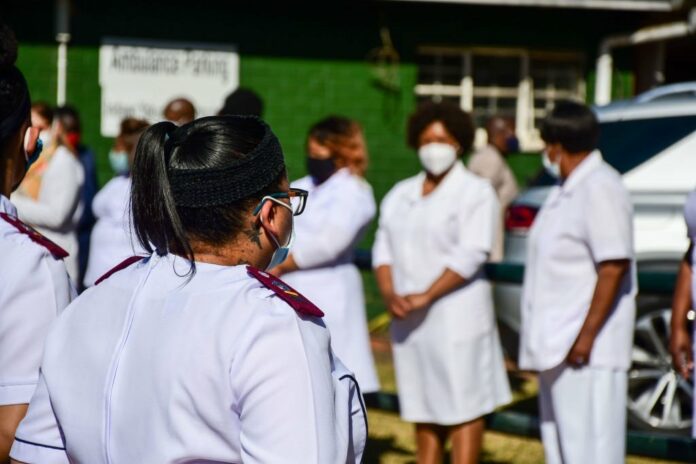- An Oxfam SA report finds that the poor treatment of healthcare workers compromises the quality of health care.
- The report was launched in collaboration with the Young Nurses Indaba Trade Union.
- Nurses are the backbone of South Africa’s healthcare system, representing 77% of the public sector’s human resources in the sector.
The poor treatment of healthcare workers compromises the quality of health care and, in turn, results in the system being ill-prepared for Covid-19, Oxfam South Africa says.
“The ongoing Covid-19 pandemic has put into sharp focus, and exacerbated, a number of inequalities and fragilities that haunt the healthcare system and constrain it from delivering on its mandate in terms of the South African Constitution and regional and international human rights law in terms of the right to health,” an Oxfam SA report on health inequality reads.
According to the report, the South African healthcare system hangs on the edge of a cliff because a “a profit-seeking private healthcare sector, combined with underinvestment in an unaccountable public healthcare sector and gaps in labour policy, has driven unfair practices in the South African healthcare sector”.
The 66-page report, titled The Right to Dignified Healthcare Work, a Right to Dignified Health Care for All, was virtually launched on Wednesday by Oxfam SA in collaboration with the Young Nurses Indaba Trade Union (YNITU).
READ: 709 Gauteng public healthcare workers test positive for Covid-19, health dept reveals
The report made a number of findings. It said that those in the healthcare profession were underpaid for the amount of work and hours they put in.
A health worker screens a resident at Diepsloot for Covid-19.
Nurses were the backbone of South Africa’s national healthcare system as they represent 77% of the public sector’s human resources.
In addition, those healthcare workers being recruited in response to the Covid-19 pandemic were likely to be left out in the cold and out of work once surge capacity was no longer needed.
Unequal
It further found that, in the public sector, one nurse served 200 patients and one community health worker served 101 households, while 70% of the country’s doctors were in the private sector, creating an unequal and elitist healthcare system.
“We must all stand in solidarity with nurses and community healthcare workers, and call for an end to the injustice and inequality they experience. Our report demonstrates a link between healthcare workers’ poor working conditions, and the poor quality of healthcare available in the country.
Medical staff at a quarantine centre for Covid-19 in Pietermaritzburg.
“Ultimately, quality sustainable healthcare can only be achieved through decommodifying services, public investment on infrastructure and the health labour force to guarantee staffing levels, living wages, and dignified working conditions,” Oxfam SA said.
After highlighting gaps in policy and implementation which led to the right to decent and dignified work for nurses and community health workers being compromised, the report made several recommendations:
- There is a need for greater transparency in the healthcare sector, specifically of data around workforce compositions, pay scales, etc, from both the private and public healthcare actors;
- A healthy workforce creates a well-functioning health system and, therefore, the report recommends that conditions need to be created for decent conditions and a living wage;
- Increase government’s public spending on healthcare as a matter of urgency;
- Reduce inhumane working hours for healthcare workers;
- End discrimination against womxn* who make up 90% of the workforce;
- Create a security of contracts for all healthcare workers, including the removal of temporary and outsourced work, which causes workers to live with insecurity and worry;
- Recognise the unpaid care work which has a monetary value of $10.8 trillion a year, according to the report.
“If implemented, these recommendations stand to address the key barriers to decent work that female healthcare workers face.
“This is crucial as this will not only improve the lives of mullions of womxn working in the healthcare sector, but will lead to better and higher quality healthcare in South Africa,” the report concludes.
*The report specifically uses the term “womxn” which is an alternative term to include non-cisgender women.
